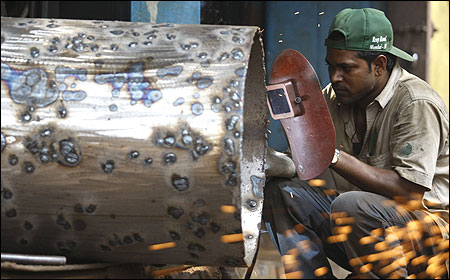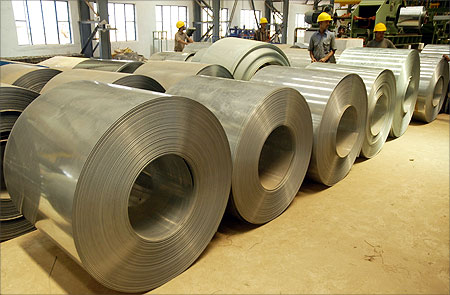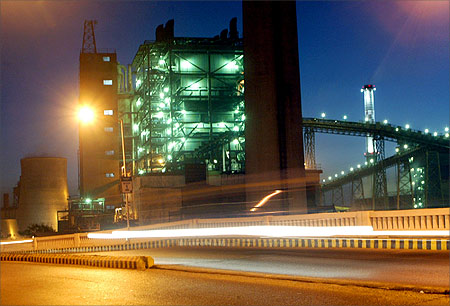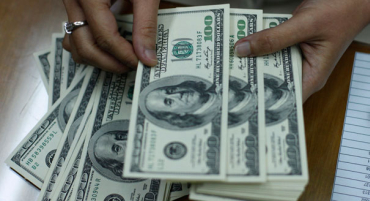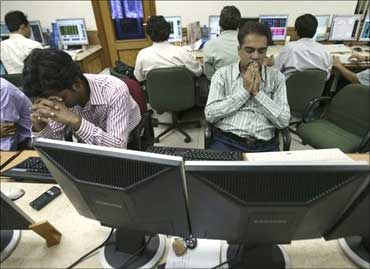 | « Back to article | Print this article |
Government in ICU, economy in ICCU
As my clients opened the registered post their worst nightmare came true. It was a show-cause notice issued by a government department.
It threatened to take coercive action, including closure of business and arrest of directors and senior officials of the company, if reply was not provided to the 'satisfaction' of the government within the date mentioned in the notice.
The matter was indeed serious.
For the next fortnight or so my client's office was in a tizzy. Naturally, nothing else matted. After all, it was a matter of life and death for them.
No one talked about anything, except planning, preparing and actually replying to the show-cause notice. Lawyers were consulted and opinion was sought from experts of all hues.
Click NEXT to read on . . .
Government in ICU, economy in ICCU
As the matter related to a few years back, old records were pulled out from the record room, correspondences traced and evidence collected to explain the position.
That was not all. A war room was set up. Strategy sessions were held. Various 'what if' scenarios were examined. Plan B to plan Z were put in place.
The management was alive to the developing situation. Naturally that meant it cost a fortune to my clients.
On top of it business had come to a standstill. But who cared? Money was spent like water. 'No budgetary constraints', was the common refrain. The management was alive to the developing situation.
D-day arrived earlier than anticipated. We arrived in Delhi with bag loads of evidence. Given my experience in handling such issues, I personally did not have much hope. After all, in all such matters, officers first decide and then issue the show-cause notice.
Click NEXT to read on . . .
Government in ICU, economy in ICCU
Hearing, in such circumstances, is a farce. I know. My clients knew. Everyone knows. Crucially, the government knows too.
Initially, the officer who heard us was stoic, tight-lipped and grim. My heart sank. No chance, I thought. With prayers on my lips, I began presenting my client's case. A few minutes into the hearing the officer smiled.
Relief enveloped us like a warm blanket. Slowly but surely within the next hour or so I was able to convince the officer that legally he had to withdraw the show-cause notice issued to my clients.
Inexplicably, after my presentation, the officer was looking distinctly uncomfortable. Unable to maintain eye contact, his body language suddenly turned negative. He was apologetic. And why not, I thought, after all he had issued the show-cause notice wrongly.
Or was he hinting at something simple that I could not fathom? Has the fight against corruption not yet reached the corridors of power? Has it remained only on the streets?
Click NEXT to read on . . .
Government in ICU, economy in ICCU
I was wrong on both counts. "I agree with your arguments," he said. That was a big relief. But, he immediately added, "I will not record your presence today. You will seek an adjournment and I will grant it. Come in June and we will settle the issue."
"But why?" I asked. A fortnight of intensive labour would go down the drain. And who knows what may happen in June. After all, by then horses may fly!
The officer was not flustered. "Sir," he explained, "you do not understand. If I give you a favourable order no one will believe it. Your competitors will make use of the RTI and make shrill allegations against both of us. And given the state of affairs in the country, no one will believe within my department that you deserved the same. Rather it is lose-lose for both of us."
What is the way out, I remonstrated. "Would suggest an alternative," he said and added softly "I will give you a soft but adverse order. You can go to the courts and I am sure would instantly get justice. That way, both of us are safe." With that, he concluded.
Having contributed our bit to the Indian economy and growth of the GDP, we returned to Chennai, perhaps to continue the battle in summer.
Click NEXT to read on . . .
Government in ICU, economy in ICCU
Paralysis the way of life
Friends who deal with the government departments are not surprised by this experience of mine. Administrative paralysis has come to be recognised as a way of life. Either, one gets no order or, in the alternative, one gets a bad order, and hence is forced to agitate in appellant forums, mostly courts.
It is this administrative paralysis that is costing India dear. No one in the administration wants to take any decision.
The administration wants to take decisions through the courts. Then why have a huge bureaucracy (at a huge cost) in the first place?
Naturally when IIP numbers and GDP figures were released recently, it was not a shock to those who had their ear to the ground.
Those who originally fantasised about the Indian growth story suddenly realise that it seems far gloomier now. No wonder the stock markets are nervous, the Rupee is depreciating by the minute, the fiscal position is precarious, and inflation stubborn.
Click NEXT to read on . . .
Government in ICU, economy in ICCU
The government, meanwhile, is clueless. A clueless government dithers. A dithering government is the worst enemy of the economy. And that is what is playing out in India.
At the core of the matter are the issues relating to governance, the lack of decision-making ability.
Friends in apex chambers tell me that on the one hand we have power shortage that is crippling the national economy.
If you thought this is on account of a mis-match between demand and supply, think again. They tell me that approximately 25,000 MW of thermal power plants are unable to be operated on account of lack of coal.
And pray why is there a coal shortage? Simple. No one wants to take decisions in case of imports of coals. And when it comes to domestic mining, the less said the better!
Click NEXT to read on . . .
Government in ICU, economy in ICCU
After all, over the years, coal purchase has been a play field marred by corruption. Naturally every kilo of coal is suspected of being tainted. And now the corrupt fear of being hauled over the coals!
The revenge of the corrupt?
The issue is equally worse within the revenue departments. Assessing officers simply come up with the specious logic that the assessee has several layers of appeal to settle his tax dispute with the government.
This means that most decisions in the initial stage go against the assessee, especially when complex issues of law (remember tax laws are always complex) are involved.
For years assessees used to get over this reluctance of their assessing officer by what is euphemistically called 'speed money'. No. I am not talking of corruption here. Speed money is simply to make the officer agree that two-plus-two is four. Else it could be anything but four.
Now in the aftermath of the fight against corruption, no one within the government wants to take speed money. That means even ordinary administrative decisions don't get taken.
Click NEXT to read on . . .
Government in ICU, economy in ICCU
In this overall atmosphere of cynicism why take a decision and get stuck. It is this administrative paralysis that translates into the crisis of confidence of business.
Remember, businesses that are forced to depend on the decisions of the government, are struck. This in turn means that the Indian growth story gets retarded.
And the solution offered by the government is equally specious. Instead of tackling this issue head on, the government seeks to import confidence by increasing FDI limits in sector after sector.
To tackle inflation it wants to have FDI in retail. To tackle the mess in our civil aviation it wants to increase FDI in that sector. Similar efforts are on in case of pension management as well as insurance.
And pink newspapers, analysts and economists (who have rarely visited a government office) continue to preach the government the need for more reforms -- read FDI -- to tackle the crisis of confidence in the national economy.
Click NEXT to read on . . .
Government in ICU, economy in ICCU
They believe that such policy measures, even if they do not result in forex flows, will improve the overall investment climate in the country.
In the process little do these people realise that one cannot legislate confidence or import confidence by increasing FDI limits. And even if it is done, why should people from overseas invest in the Indian economy when Indians themselves are loath to invest in India?
The reason for the same is psychological, not physical. One wants to partner success, not failure: this is especially true of global investors. Once Indian entrepreneurs invest and are successful, foreign investment will partner them. If they fail, no foreigner will invest in India.
It is a simple proposition. You do not ally with a reluctant man or a beggar in your business. It is human psychology to associate with success. And unless success is demonstrated in adequate measure by domestic economy, by domestic businessmen, FDI will not flow. And even if it flows it will be minimal.
It is one lesson that the prime minister, it appears, has failed to understand. Perhaps, it is the one subject in macroeconomics that they failed to teach him in college. No wonder, when governance continues to be in ICU (intensive care unit) and the economy in ICCU (intensive cardiac care unit), the prime minister is silent. 'Out of syllabus,' I suppose.
The author is a Chennai-based chartered accountant. He can be contacted at mrv@mrv.net.in




